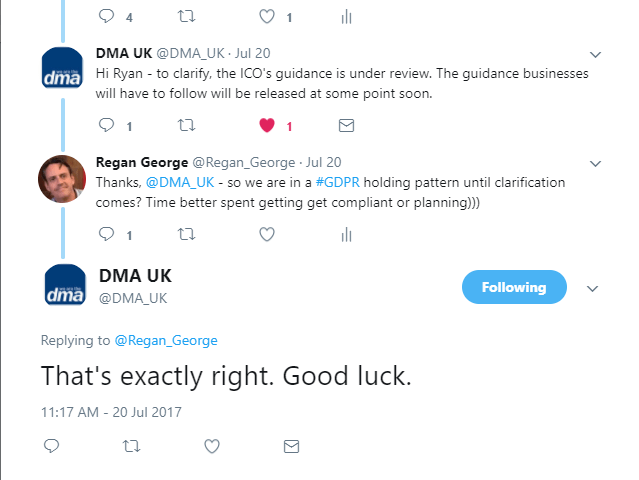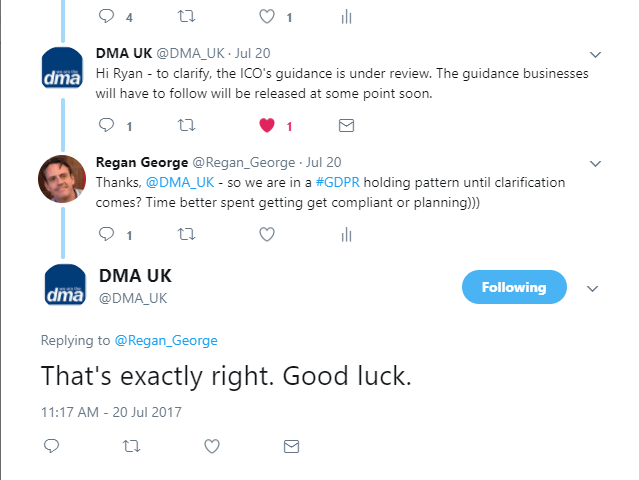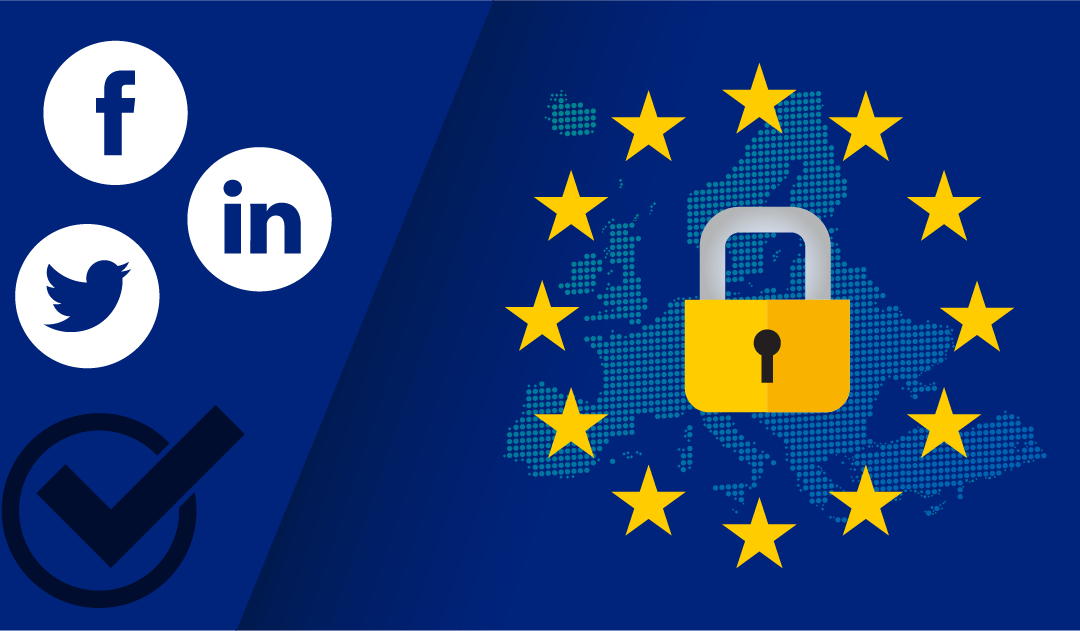– – Marketers can beat GDPR with Social Media
Unless you are living under a rock, by now you will be aware that General Data Protection Regulation (GDPR) is going to have a profound effect on your future marketing strategy and tactics in the EU.
Come the 25th of May 2018 the two biggest changes for marketers will be:
1. No longer being able to send an email (even a letter) without your prospects clear and unambiguous permission (opt-in)
2. Not being allowed to automatically drop cookies on your prospect unless they have given you clear and unambiguous permission (opt-in)
With email marketing and retargeting often cited the two highest converting channels, these GDPR challenges are going to leave a lot of marketers in a pickle.
One of the ways to combat the effects of GDPR on your email strategy is to get as much of your email database to opt-in through a Permission Passing campaign as possible. In this article we look at the uncertainties, GDPR casts on Social Media Marketing, and how Social Media can play a role in your new GDPR compliant event management strategy. Now is the time to evaluate how to bolster your social media assets to overcome your GDPR woes.
Social Media Platforms and GDPR – What we know for sure
Presently there are only two things we know for sure that social media platforms will need to undertake to be compliant with GDPR law.
1. The right to be forgotten. Yes, if you asked Facebook/Twitter etc. to delete you account and all associated personal data they must comply. Additionally, if you request that they supply all the personal data they hold on you they are legally required to provide it.
2. Children under the age of sixteen will need their parents consent before accessing social media platforms.
OK – so we know two things for sure. Not a great deal I know.
One of the biggest challenges facing Marketers trying to implement GDPR compliant solutions is the lack of clarity.
Social Media Platforms and GDPR – What we know for sure
Presently there are only two things we know for sure that social media platforms will need to undertake to be compliant with GDPR law.
1. The right to be forgotten. Yes, if you asked Facebook/Twitter etc. to delete you account and all associated personal data they must comply. Additionally, if you request that they supply all the personal data they hold on you they are legally required to provide it.
2. Children under the age of sixteen will need their parents consent before accessing social media platforms.
OK – so we know two things for sure. Not a great deal I know.
One of the biggest challenges facing Marketers trying to implement GDPR compliant solutions is the lack of clarity.
A prime example is that the UK’s Direct Marketing Association (DMA) is arguing with the UK’s Information Commissioner’s Office (ICO) that their interpretation of the EU’s ‘opt-in’ is incorrect. We are presently in a holding pattern waiting on the ICO to review and issue an official standing on opt-in.

Shamefully, with less than ten months until we need to be GDPR compliant, we are still in a review/consultation period.
For some light reading, here is Facebook’s response to the EU’s request for consultation.
Taking this lack of clarity into account, here is my thinking on why Social Media can help us beat our GDPR woes.
Social Platforms are building GDPR strategies.
If I’m actively considering how social platforms will help overcome Europe’s GDPR marketing woes, the social platforms are going to be a step or two ahead.
There are 14 LinkedIn profiles of people employed by the major platforms which have the key word GDPR in them:

Interestingly, Facebook has seconded a top privacy lawyer in London with extensive GDPR experience. 
If I were a Chief Strategy or Revenue Officer at Facebook and LinkedIn I would have GDPR high on my agenda, I’d leave the compliance to my lawyers and be focusing how we used GDPR to increase revenue.
Social Platforms can be a GDPR walled garden
When you first signed up to Facebook or LinkedIn did you read their ‘Terms of Services’ or their Privacy or Cookies policies? Here I go again, let me assume ‘NO’!
If you did and decided that you didn’t want to explicitly and unambiguously accept their terms or policies, then they didn’t let you in. That’s right: if you don’t accept their terms you are not getting access. The lawyers at the big platforms will update their terms of services, policies and make sure it’s an explicit and unambiguous opt-in, aka GDPR compliant and it will be business as usual.
The Social Platforms may be compliant, but watch what you do.
Although we anticipate playing within a GDPR compliant walled garden is going to be a safe haven, what you do with the data these platforms can provide puts you straight back into the danger zone.
- Exporting your LinkedIn or Facebook contacts (including their email) and updating your CRM database will be a no-no (unless of course you have sought and been given explicit and unambiguous permission).
- Exporting your LinkedIn connections emails and sending them emails from your company emails is a no-no.
- Obviously using those handy little chrome extensions that generate a business email from a LinkedIn profile then sending an email is – yes you guessed it – a no-no.
GDPR Social Media Strategies you can implement today
Despite the uncertainty and lack of clarity, Social Media marketing does offer a few strategies that you can implement to help you stave off the effects of GDPR:
1.Build an engaging and authoritative Social Media presence
Social Media basics would still apply in a post GDPR world. Building an engaging social media presence with content that delights and informs your audience remains a sure fire way to command their attention. The key difference is that a Social Media strategy is all year round. This flies in the face of some (backward) event marketing strategies where an email database is furiously exercised a few months ahead of the event and then left dormant until the need arises to sell tickets to the next event. A successful Social Media Strategy uses the event’s social channels as a conduit for information (and dialogue!) throughout the year, and creates a connecting tissue with the various stakeholders 24/7.
2. Invest in a Social Community for your brand or event.
“Conversation equals conversion”. Maintaining an engaging Social Media Presence is a great first step, but this can be taken further by developing Social Media Communities that support your event. Whether through a Facebook Group associated with your page or a stand alone LinkedIn Group, the social media tools exist to create conversational spaces. These groups can not only be leveraged to promote your event, but to improve them as well. Groups offer a sounding board with your main stakeholders, and allow you to ask questions and test potential event seminar topics and themes in a digital space before committing to them in the real world as part of your event programme.
3. Start experimenting with Paid Social
Social Media advertising offers a wealth of precision targeting capabilities. Whether you are using Job Titles or an accounts based approach on LinkedIn, or building custom audiences and lookalike audience on Facebook, the fact that many (if not most) of your prospects are in fact on Social Media cannot be disputed. Paid Social gives you effortless.access to this audience in a GDPR compliant way.
Summary
As a B2B or an events company you simply don’t have the luxury of telling your prospects/clients that unless they opt-in, you will not allow them to play with you. On the flip-side, all the big social platforms can and will do exactly that.
I’m sure everyone reading this has some sort of social media strategy supporting their sales and marketing efforts – however to win the GDPR battle having a half-baked social media strategy isn’t going to wash. To win, your social media, community and social selling strategy and execution is going to have to be A-grade!
This blog post is part of our series of articles examining the impact of GDPR on Event Marketing.
- GDPR: the only acronym event marketers need to be obsessed with in 2017
- GDPR Strategy: Getting your existing email database opted-in
- GDPR Social Media Strategies (You are here now)
- GDPR compliant marketing channels, countering decline in email marketing effectiveness (Coming Soon)
- How GDPR will affect your digital and social advertising and how to overcome these challenges (Coming Soon)
- A timetable for GDPR compliance (Coming Soon)
